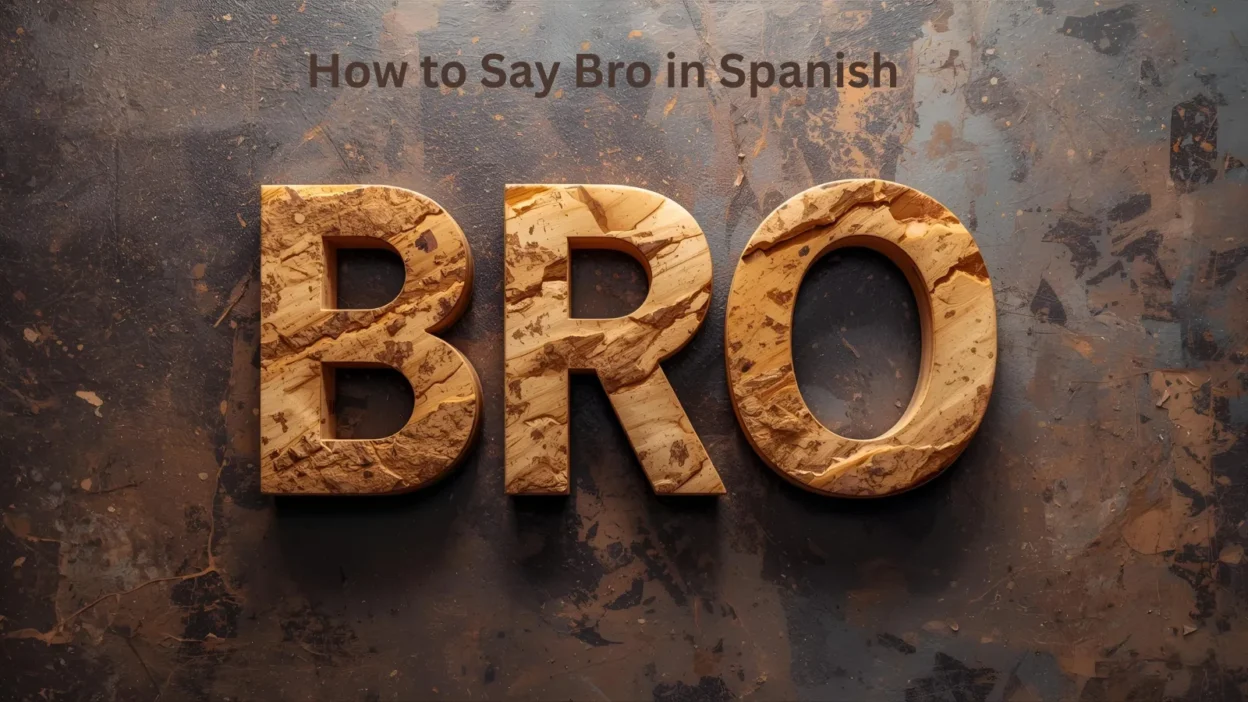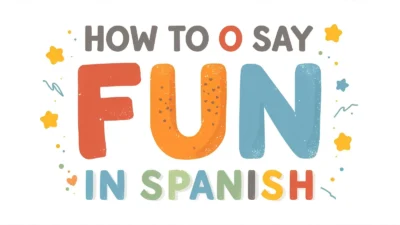Bro in Spanish is commonly said as “Bro”, “Hermano”, or “Tío,” depending on the situation and region. “Hermano” means brother and is used both for real siblings and close friends. “Bro” is also widely used in casual conversations, especially among young people.
Most people search how to say bro in Spanish when learning slang, chatting with Spanish-speaking friends, or watching movies and social media content. The main intent is to find a natural, friendly word that feels casual and fits everyday speech without sounding too formal.
Using “bro” in Spanish helps conversations feel relaxed and modern. Words like “Tío” (Spain) or “Hermano” (Latin America) are easy to remember and commonly understood. These terms work well in friendly chats, jokes, and informal messages.
Say Bro in Spanish
Let’s explore 15 ways to say ‘Bro’ in Spanish. From casual slang to friendly nicknames, you’ll learn how to call your friends ‘bro’ like a local!
Whether you’re chatting online or in person, knowing the right slang makes your conversations more real and relaxed.
1. Hermano – “Brother”
Origin: From Latin germanus meaning “of the same family.”
Example:
👤 A: ¿Qué tal, hermano?
👤 B: Todo bien, gracias. ¿Y tú?
Use: Neutral, friendly; works for real brothers or male friends everywhere.
2. Mano – “Bro” (short for Hermano)

Origin: Slang abbreviation of hermano used across Latin America.
Example:
👤 A: ¿Qué onda, mano?
👤 B: Todo tranquilo, bro.
Use: Casual; common in Mexico and Central America.
3. Bro – “Bro” (English slang)
Origin: Borrowed from English pop culture.
Example:
👤 A: ¡Ey bro! ¿Cómo estás?
👤 B: Bien, hermano.
Use: Trendy and informal; used among young people and online.
4. Carnal – “Bro / Close friend”
Origin: From carne meaning “flesh”; used to describe a blood-level friendship.
Example:
👤 A: ¿Qué pasa, carnal?
👤 B: Todo bien, carnalito.
Use: Common in Mexico; shows deep friendship.
5. Pana – “Bro / Buddy”

Origin: Caribbean slang, popular in Venezuela, Puerto Rico, and the Dominican Republic.
Example:
👤 A: ¡Ey pana! ¿Qué hay de nuevo?
👤 B: Todo bien, mi hermano.
Use: Informal, warm, and friendly.
6. Compadre – “Mate / Bro”
Origin: Literally means “godfather,” but also used for a close friend.
Example:
👤 A: Compadre, ¿cómo va la vida?
👤 B: Excelente, viejo amigo.
Use: Semi-formal or affectionate, common in Mexico and South America.
7. Socio – “Partner / Bro”

Origin: From the business term socio (partner), but slang for “friend.”
Example:
👤 A: ¡Qué pasa, socio!
👤 B: Todo tranquilo, hermano.
Use: Casual; common in Spain and Argentina.
8. Cuate – “Bro / Pal”
Origin: From the Nahuatl (Aztec) word coatl, meaning “twin.”
Example:
👤 A: ¿Qué onda, cuate?
👤 B: Nada nuevo, bro.
Use: Exclusive to Mexico; very informal.
9. Primo – “Cousin / Bro”
Origin: Means “cousin,” but used like “bro” in slang.
Example:
👤 A: ¿Qué haces, primo?
👤 B: Solo descansando, hermano.
Use: Common in Spain and Latin America; casual.
10. Amigo – “Friend”
Origin: From Latin amicus meaning “friend.”
Example:
👤 A: ¡Hola amigo!
👤 B: ¡Qué gusto verte, bro!
Use: Neutral; suitable for all ages and settings.
11. Colega – “Dude / Bro”

Origin: Means “colleague,” but used casually in Spain.
Example:
👤 A: ¡Eh colega! ¿Vienes al bar?
👤 B: Claro, vamos.
Use: Informal; mostly used by young people in Spain.
12. Parce / Parcero – “Bro / Buddy”
Origin: Colombian slang; parce comes from partner.
Example:
👤 A: ¡Qué más, parcero!
👤 B: Todo bien, mi pana.
Use: Very common in Colombia; friendly and warm.
13. Cabrón – “Bro / Dude” (caution: slang)
Origin: Vulgar originally, but in some countries used jokingly.
Example:
👤 A: ¡Oye cabrón! Hace tiempo sin verte.
👤 B: Jajaja, igual bro.
Use: Very informal; only use with close friends.
14. Loco – “Dude /Wild bro”
Origin: Literally means “unbelievable,” but affectionately used in slang.
Example:
👤 A: ¡Ey loco! Vamos a jugar fútbol.
👤 B: De una, hermano.
Use: Fun and casual; common in the Caribbean and Central America.
15. Gallo – “Bro / Cool guy”
Origin: Means “rooster,” but in slang refers to a bold or strong man.
Example:
👤 A: Eres un gallo, bro.
👤 B: Gracias, mano.
Use: Common in Central America; light and playful.
FAQs
Q1: What’s the best translation of “bro” in Spanish?
A: Hermano is the most accurate and widely understood translation for “bro.”
Q2: What do Mexicans say instead of “bro”?
A: Mexicans often say carnal, mano, or wey (informal slang for “dude”).
Q3: Can I say “bro” in Spanish conversations?
A: Yes! Many young people use bro directly, especially in casual chats or social media.
Q4: What’s a Colombian word for “bro”?
A: Colombians use parce or parcero to mean “bro” or “buddy.”
Conclusion:
Knowing how to say bro in Spanish helps you speak more naturally and confidently with native speakers. It’s a simple way to build friendships and sound like part of the group. From casual chats to online conversations, using the right slang makes your Spanish feel authentic and fun. So next time you talk to a Spanish-speaking friend, try one of these “bro” phrases and see how easily it brings you closer.



